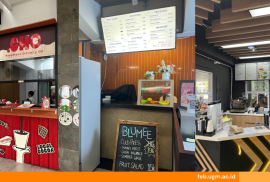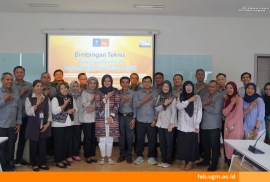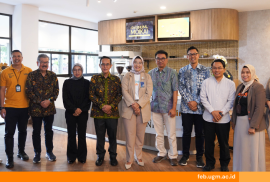The Center for Information Systems Studies (PKSI) at the Faculty of Economics and Business UGM has launched a new index called the Gadjah Mada Digital Transformation Governance Index (GM-DTGI). GM-DTGI is a tool to assess the level of digital transformation in second-level local governments. Prof. Syaiful Ali, MIS., Ph.D., Ak., CA., the lead researcher of GM-DTGI, explained the index during its launch at the Sukadji Ranuwihardjo Auditorium, MM FEB UGM, on Friday (October 11, 2024).
Syaiful explained that the acceleration of digital transformation during the COVID-19 pandemic 2020 was the main background for the launch of this index. He said the pandemic disrupted our daily lives due to the rapid digitalization process. “We used to think that technology adoption would be slow, but it was fast. Now the challenge is not to stop it, but to optimize digital technology,” said Syaiful.
Data from the 2023 Digital Ranking of countries worldwide showed that Indonesia ranked 59th, lagging behind other ASEAN countries such as Singapore, Malaysia, and Thailand. To catch up, the Indonesian government is encouraging digital transformation at the regional level. Because these governments interact directly with the public, the national index will improve if their digital index improves. “The goal of this index is not about ranking, but how local governments can provide better digital services to the public,” Syaiful explained.
He revealed that the GM-DTGI research began in 2021 and involved 23 experts, nine from Indonesia and 14 from abroad. The GM-DTGI assessment consists of seven pillars, which include 50 assessment indicators. These pillars include governance and leadership, cybersecurity and privacy, user-centric platform design, regulation and policy, public administration reform and change management, data governance, and digital ecosystem.
As the world’s first index to assess digital transformation at the local government level, Syaiful noted that they did not build the index from scratch. It was developed based on indices created by the World Bank, OECD, IMD, and MRI, which only focus on the national level. As a result, he hopes the GM-DTGI can become a catalyst for digital transformation at the local level, serving as a diagnostic tool for local governments to identify strengths, weaknesses, and areas for improvement. “We have a complete picture so local governments can understand their advantages, weaknesses, and what needs to be improved,” he explained.
Based on the 2024 GM-DTGI measurements, the most implemented strategies are in regulation and policy, while cybersecurity and privacy are the least implemented. In addition, the development of ICT infrastructure is primarily top-down.
District and city governments across Indonesia were also invited to the GM-DTGI launch. During the panel session, several district and city governments presented successful digital transformation examples from the top five districts/cities according to GM-DTGI 2024. First, Semarang, undergoing digital transformation since 2013, has started installing internet infrastructure throughout the city. Semarang has also installed 10,000 CCTV cameras in each RT/RW and uses artificial intelligence (AI) on the cameras to detect full garbage bins.
Second, the city of Yogyakarta implemented digital transformation by developing the Jogja Smart Service app. This app is a super app for all government services.
Third, the city of Banjarmasin also developed a super app for government services called Banjarmasin Pintar. In addition, they conducted study visits to Yogyakarta to learn about the implementation of digital transformation in public services.
Fourth, Banyuwangi Regency has focused its digital transformation efforts on poverty alleviation through the Emergency Poverty Unit (UGDK) app, which uses personal data and poverty indicators to help the government identify and distribute aid to those in need. Banyuwangi also has a super app called Banyuwangi Smart Village, which provides annual training for IT staff in Jakarta and South Korea.
Fifth, the Sragen Regency has developed several innovations to implement digital transformation, including the “One Family Card, One Digital Talent” program to promote digital literacy in the community and facilitate online government services.
The successful digital transformation of these five districts/cities in Indonesia is clear evidence that Indonesia is one step closer to achieving its vision of Digital Indonesia 2045. It is hoped that the GM-DTGI will help local governments recognize and understand the critical role of digital transformation at the district/city level. It will improve Indonesia’s global digital transformation index and help reduce technological and economic disparities.
Reportase: Najwah Ariella Puteri
Editor: Kurnia Ekaptiningrum
Watch the full seminar video on https://www.youtube.com/live/Ds7nElw-EMk
Sustainable Development Goals











